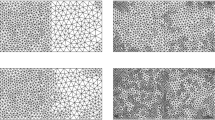Abstract
In this paper, we propose some new residual-based a posteriori error estimators for the mortar finite element discretization of the second order elliptic equations with discontinuous coefficients. Reliability and efficiency of the estimators are given. Our analysis does not require any saturation assumptions and the mesh restrictions on the interface which are often needed in the literature. Numerical experiments are presented to confirm our theoretical analysis.
Similar content being viewed by others
References
Ainsworth M.: Robust a posteriori error estimation for nonconforming finite element approximation. SIAM J. Numer. Anal. 42, 2320–2341 (2005)
Ainsworth M.: A posteriori error estimation for lowest order Raviart–Thomas mixed finite elements. SIAM J. Sci. Comput. 30, 189–204 (2007)
Ainsworth M., Oden J.T.: A posteriori error estimation in finite element analysis. Pure Applied Mathematics. Wiley, New York (2000)
Babuska I., Aziz A.K.: On the angle condition in the finite element method. SIAM J. Numer. Anal. 13, 214–226 (1976)
Bernardi C., Hecht F.: Error estimators for the mortar finite element discretization of the Laplace equations. Math. Comput. 71, 1371–1403 (2002)
Bernardi C., Maday Y., Patera A.: Domain decomposition by the mortar element method. In: Kaper, H.G., Garbey, M., Pieper, G.W. (eds) Asymptotic and Numerical Methods for Partial Differential Equations with Critical Parameters, pp. 269–286. Kluwer, Dordrecht (1993)
Bernardi C., Maday Y., Patera A.: A new nonconforming approach to domain decomposition: the mortar element method. In: Brezis, H., Lions, J.L. (eds) Nonlinear Partial Differential Equations and their Application, College de France Seminar, vol. XI, pp. 13–51. Pitman, London (1994)
Bernardi C., Verfürth R.: Adaptive finite element methods for elliptic equations with nonsmooth coefficients. Numer. Math. 85, 579–608 (2000)
Bernardi C., Hecht F., Mghazli Z.: Mortar finite element discretization for the flow in a nonhomogeneous porous medium. Comput. Methods Appl. Mech. Eng. 196, 1554–1573 (2007)
Brenner S.C: Poincaré–Friedrichs inequalities for piecewise H 1 functions. SIAM J. Numer. Anal. 41, 306–324 (2003)
Byfut A., Gedicke J., Günther D., Reininghaus J., Wiedemann S.: FFW Documentation. Humboldt University of Berlin, Germany (2007)
Cai Z., Zhang S.: Recovery-based error estimator for interface problems: conforming linear elements. SIAM J. Numer. Anal. 47, 2132–2156 (2009)
Cai Z., Zhang S.: Recovery-based error estimators for interface problems: mixed and nonconforming finite elements. SIAM J. Numer. Anal. 48, 30–52 (2010)
Carstensen C., Hoppe R.H.W.: Unified framework for an a posteriori error analysis of non-standard finite element approximations of H(curl)-elliptic problems. J. Numer. Math. 17, 27–44 (2009)
Carstensen C., Bartels S., Jansche S.: A posteriori error estimates for nonconforming finite element methods. Numer. Math. 92, 233–256 (2002)
Carstensen C., Hu J.: A unifying theory of a posteriori error control for nonconforming finite element methods. Numer. Math. 107, 473–502 (2007)
Carstensen C., Hu J., Orlando A.: Framework for the a posteriori error analysis of nonconforming finite elements. SIAM J. Numer. Anal. 45, 62–82 (2007)
Chen Z., Dai S.: On the efficiency of adaptive finite element methods for elliptic problems with discontinuous coeficients. SIAM J. Sci. Comput. 24, 443–462 (2001)
Chen H., Xu X., Hoppe R.: Convergence and optimality of adaptive nonconforming finite element methods for nonsymmetric and indefinite problem. Numer. Math. 116, 383–419 (2010)
Chen L., Zhang C.: AFEM@matlab: a MATLAB package of Adaptive Finite Element Methods, Technical Report. University of Maryland, Maryland (2006)
Ciarlet P.G.: The Finite Element Method for Elliptic Problems. North-Holland, Amsterdam (1978)
Hu J., Shi Z.: A new a posteriori error estimate for the Morley element. Numer. Math. 112, 25–40 (2009)
Kunert, G.: A posteriori error estimation for anisotropic tetrahedral and triangular finite element meshes. Logos Verlag, Berlin (1999). Also PhD thesis, TU Chemnitz. http://archiv.tu-chemnitz.de/pub/1999/0012/index.html
Luce R., Wohlmuth B.I.: A local a posteriori error estimator based on equilibrated fluxes. SIAM J. Numer. Anal. 42, 1394–1414 (2004)
Marcinkowski L.: The mortar element method with locally nonconforming elements. BIT 39, 716–739 (1999)
Scott L.R., Zhang S.: Finite-element interpolation of non-smooth functions satisfying boundary conditions. Math. Comput. 54, 483–493 (1990)
Verfürth R.: A Review of a Posteriori Error Estimation and Adaptive Mesh-Refinement Technique. Wiley-Teubner, Chichester (1996)
Wheeler M.F., Yotov I.: A posteriori error estimates for the mortar mixed finite element method. SIAM J. Numer. Anal. 43, 1021–1042 (2005)
Wohlmuth B.I.: A residual based error estimator for mortar finite element discretizations. Numer. Math. 84, 143–171 (1999)
Wohlmuth B.I.: Hierarchical a posteriori error estimatiors for mortar finite element methods with Lagrange multipliers. SIAM J. Numer. Anal. 36, 1636–1658 (1999)
Wohlmuth B.I.: A mortar finite element method using dual spaces for the Lagrange multiplier. SIAM J. Numer. Anal. 38, 989–1012 (2000)
Wohlmuth B.I.: An a posteriori error estimator for two-body contact problems on non-matching meshes. J. Sci. Comput. 33, 25–45 (2007)
Xu X., Chen J.: Multigrid for the mortar element method for P 1 nonconforming element. Numer. Math. 88, 381–398 (2001)
Zhang S., Wang M.: A posteriori estimators of nonconforming finite element method for fourth order elliptic perturbation problems. J. Comput. Math. 26, 554–577 (2008)
Author information
Authors and Affiliations
Corresponding author
Additional information
This work was supported by the special funds for major state basic research projects (973) under 2011CB309701 and the National Science Foundation (NSF) of China under the Grants 10731060, 11071124 and 11171335.
Rights and permissions
About this article
Cite this article
Wang, F., Xu, X. Some new residual-based a posteriori error estimators for the mortar finite element methods. Numer. Math. 120, 543–571 (2012). https://doi.org/10.1007/s00211-011-0413-0
Received:
Revised:
Published:
Issue Date:
DOI: https://doi.org/10.1007/s00211-011-0413-0




